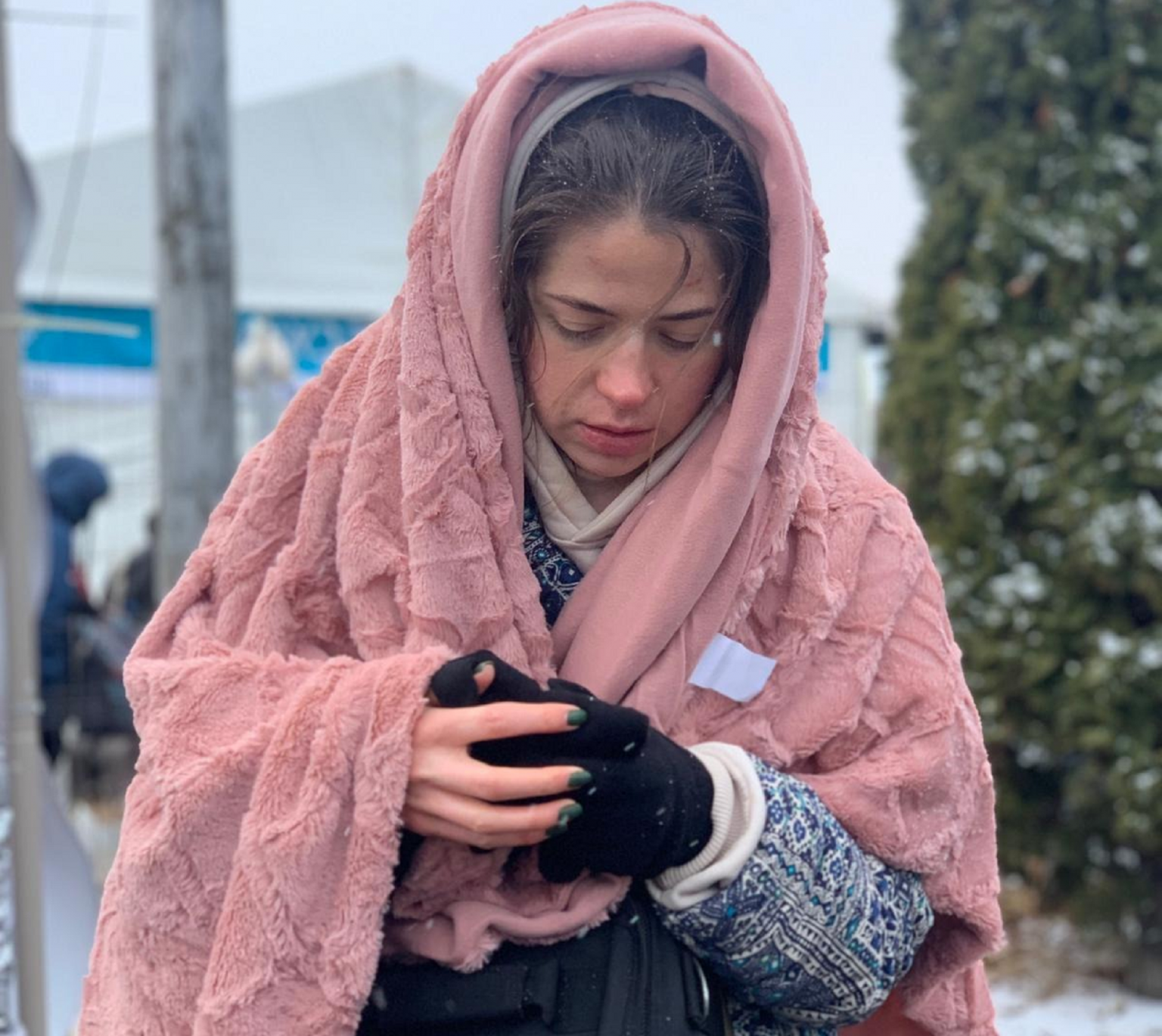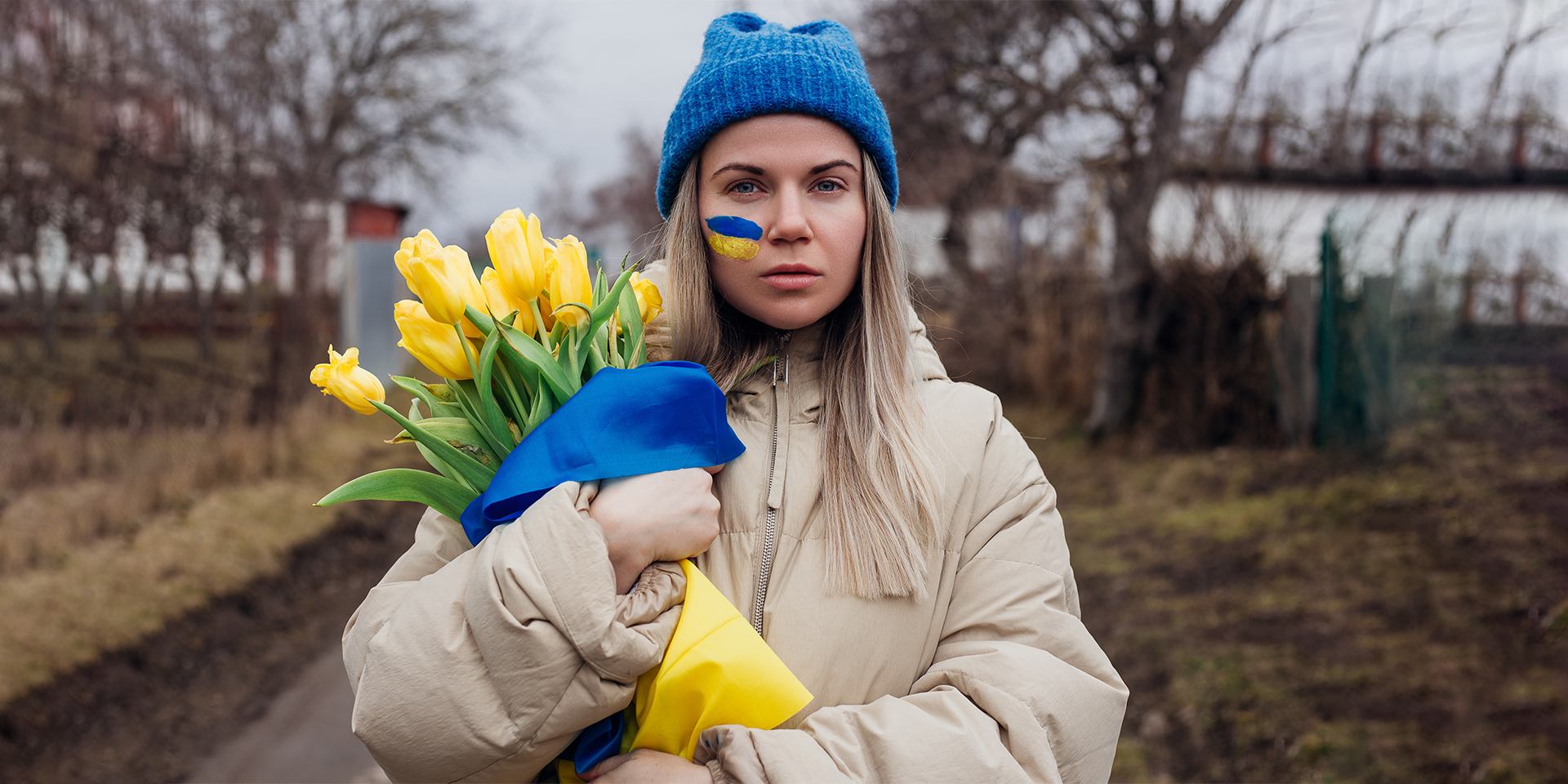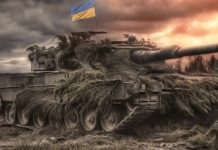The wind is blowing and it is snowing at the Siret Customs Point. Refugee groups stream by, women with children clinging to them, and the words of a little girl from another war, concluded almost eight decades ago, keep running through my mind: “And this was imprinted in my mind, that when my father is not home, it is war.”
It’s been snowing since morning, sometimes with huge flakes, most of the time with small and frequent ones, and I’m thinking how much I would normally enjoy the sky’s white spectacle, if it weren’t March, if it weren’t for the war. If I didn’t see this wave of frozen people, carrying their luggage here and leaving their hearts at home.
I wanted to go to Siret from the beginning, after seeing the first images and reading dozens, hundreds of comments on social networks, most of them expressing solidarity and compassion. A few (though still too many) are a blend of more or less illogical messages that trivialize or silence the tragedy of refugees, either because they don’t think the war is real or because they have come to the conclusion that refugees do not need as much help as the press claims and that the resources that go to them could be better spent.
Ukrainian refugees and volunteers
I am finally here, right next to the fire brigade, together with some of the volunteers from ADRA Romania and the short distance from the customs checkpoint allows me to examine the refugees before they reach the point where they are directed to the tents or to the cars that provide transportation. It’s very cold, the girls who help with the translation are completely frozen, but the wind doesn’t erase the smiles on their faces. Sanda and Diana are students, members of the Amicus Student Association, originally from the Republic of Moldova. They say they did not imagine that they would get to use their knowledge of the Russian language here in Romania.
The hours go by, and I now understand much better the words of an ADRA volunteer with whom I spoke on the phone two days prior to my departure and who confessed that he did not cry in all his life as much as he had cried in the last days spent in customs.
I don’t think I’ve seen more than three or four young or middle-aged men all day, except for groups of Indians or Africans. In fact, I realized that I didn’t see many older men either. I don’t need to use the fingers on both of my hands to count such men who enter the country through the Siret Customs point on foot.
There are, however, many women, of all ages, many of them young, with children in their arms or in prams. And a lot of children. Some are pulling a small piece of luggage behind them, that suits their size, others, a big plush toy, perhaps the only one they could take with them, definitely their favourite one. Ieremir is one of the few children who smiles broadly, even though he is cold. He asks for a blanket from the first tent, he receives it, and leaves satisfied. He is summoned back and a pack of sweets is added to his load. Then he leaves wrapped in the fluffy blanket, sharing jovial smiles everywhere.
There is a painful juxtaposition between the innocent smile of a child and the poisoned gifts with which war covers a childhood, the howl of sirens, or the sound of bombs.
Some brought their pets with them to save them from the cannon. Children with small dogs in their arms, carefully wrapped in a blanket pass by; elderly women with cats in plastic cages and a few medium and large dogs. A grandfather pulls along a rather old dog with a scar that bites his front leg. Another one walks slowly, leaning on his cane, alongside a Central Asian shepherd dog on a leash, not particularly young either.
“Look at them, they took their dogs too,” says a bass voice behind me, and for a moment (I think) I know without a doubt what I’m going to hear. Nevertheless, I am proven wrong when the voice turns into a laudatory one—the refugees can’t be bad people, look, they could not even bear to leave the animals behind.
Later I learn a snippet of the story of the man with the cane, when one of us goes to help him load his luggage in one of the emergency minibuses that transport refugees over short distances, to the point where they are picked up to go to the train station, airport or their temporary accommodation. He is not alone, just with the dog, as I thought, but he came with his wife, daughter, and three grandchildren, one of them immobilized in a wheelchair. They have a lot of luggage. They sigh with relief to see it carefully loaded and later unloaded.
The trip with the emergency minibus is a short one, but an attentively lifted stroller and some deliberately stacked luggage connects people who don’t know each other and will never see each other again. Arriving at the destination, the boy in the wheelchair stretches out his arms, showing that he wants to be lowered only by the one who helped him from the beginning, while the man with the cane hugs the one who helped him, repeating gratefully: “My friend, my friend!”
Right next to us, two women, probably a mother and a daughter, place their luggage on the sidewalk and stop holding back the tears they had been trying to master. A few meters away, a middle-aged woman is crying and laughing at the same time as she recounts something I don’t understand, except for “mеня” (“me”) and “пожалуйста” (“please”). The interlocutor listens to her patiently and caresses her just as you would caress a child.
***
As soon as they pass the customs checkpoints, the refugees are greeted by filters set up by the authorities in collaboration with volunteers, who take care of accommodation, transport, and any other needs that arise. Sometimes there is a real competition (in the most positive sense of the word) between companies, NGOs, churches, and ordinary people, who are offering their help in various forms. Next to us, a family from Harghita is disappointed that, despite searching for a few hours, they have not found people to host for free in their boarding house in Harghita.
For the time being, Romania remains a transit country for most Ukrainians, and many of the accommodation offers come from localities that are, in most cases, incompatible with the refugees’ needs. The number of Ukrainians fleeing the country is growing steadily: one million refugees have arrived in countries neighbouring Ukraine in the first week after the invasion, and it is estimated that another seven, perhaps even nine million, could leave Ukraine in the coming months. Most likely, a flow of refugees who have no resources or relatives in the West will follow, so the need for accommodation will increase in the coming period, and there is also a need for a centralization of accommodation offers, among other things.
Families and volunteers from various churches take Ukrainian refugees from Siret Customs by personal means of transportation to accommodate them or help them get to the airport, train station, or various accommodation centres. There are also companies that provide free transportation to Europe—at the information point, a group of women going to Austria are directed to a bus that lets passengers travel for free.
Even more minibuses and buses offer transportation charging a fee, but there are Ukrainians who only have hryvnia in their wallet. They did not have time to exchange money before crossing the border into Romania. Some do not have the money to travel in any currency. An almost full bus is waiting to leave for Germany, but they deny transportation to a family of four. It is impossible for them to be picked up without paying for the tickets, the emergency minibus driver explains.
It is obvious that for some, the torment of this long journey will be prolonged. For some, however, it is about to end, as is the case of a mother with two children whose trip to Italy is paid for by a friend.
The tents set up after crossing the border are full, at least in the evening, when we go to check what else is needed and bring packages of fruit, sweets, and sandwiches. Cars with donations, blankets, bread crates, croissants, hats, and non-perishable food keep arriving at the ADRA tent, packages are being prepared and distributed, and the coordinators’ phones are ringing off the hook. There is a continuous bustle.
Sorting through piles of donations, you come to better understand what items are superfluous or even useless when it comes to refugees in transit, which ones run out quickly, even when stocks are high, and why there is a need to centralize donations, or to phone before travelling hundreds of miles to the border with cars full of products that are not needed (at least at that time).
In the tents we watch Sanda as she opens all the social doors with her smile first and then with her knowledge of the Russian language. It’s warm and crowded in the tents. There are crying children, tired mothers, luggage, food, nightstands, water and mud on the floor. It’s a real art to prevent the mud from migrating onto the folding beds and blankets, with so many children around.
There is a sadness in the air that grips my stomach, as does the concern of everyone, from adults to children, to take only a single serving of what is being offered them: the fragile fingers of children picking one single banana from the bunch, or the reluctance to take a second serving of sweets, after having already chosen a croissant, a bag of wafers, a bag of pretzels, or croissants.
We leave the tents under the watchful eyes of mothers staring at us, watching if and how well we close the zippers at the entrance, leaving behind faint echoes of words that have been overused in the past days: “cпасибо”, “thank you”, and a couple of scattered “multumesc” (“thank you” in Romanian).
Once on the street, I’m thinking of checking whether that “pazdravanie” I used so assuredly as a reply to the choir of thanks when Sanda wasn’t around sounds exactly as the translator pronounced it, just to find that it was “на здоро́вье” (pronounced “na zdoróvʹje”). I comfort myself with the thought that the refugees have heard worse things than my silly “pazdravanie.”
I would laugh with tears at my blunder, but not right then and there, a little later, in the car, feeling like Lina, Romanian playwright Caragiale’s character, who butchers the name of her master’s cigarettes on her way to the tobacco shop. It seems like a blatant proof of insensitivity, but the anecdotal charge of the incident is grafted onto the overall sadness of a day when I gathered tears that I did not want to cry and that needs a valve to release some of the tension building up.
It’s getting really dark. We take a group picture with the volunteer students, then everyone scatters to the cars. To some we don’t even get to say goodbye, others we hug as if we are old friends, even though we barely know each other’s first names. It’s snowing a lot on the way back and it’s hot—that heat I’ve been longing for all day, and snippets of images swirl in my mind, like sequences from an old movie.
The smile of the firefighter who bends, for a few seconds, over a pram to caress a cheerful baby in a playful mood.

The frozen hands of a girl wrapped in a pink blanket, who can’t seem to make her fingers fit into a pair of gloves.
The young woman dragging a troller along, with blonde strands coming out of her tight hat and a large bouquet of half withered tulips in her arms. I don’t know her name, I don’t know her story, I only find out that she received the flowers from her friend, who stayed behind, on the other side of the border. In a grey and tense setting, the bouquet of tulips looks like spring suddenly opening all the windows towards the street, after a slightly longer sleep. This bunch of tulips popping up among people who took their much-needed things with them actually looks like a scene from a movie.
However, it can also be a gentle protest against the brutal separation of those who saw each other together till death, a warning about the speed with which, in times of hardship, the most natural gestures start to look bizarre. An invitation to be saved from the vice of sterile debate and the hunt for the guilty when everything is falling apart around us, from the habit of dividing people into categories that love never knew.
For “the cry of a child terrified by war is the same in all languages” and “God is not a polyglot; He speaks only one language, which is heard inside a human who loves”.
This is perhaps the departure point of a journey through completely unknown times—the conviction that, although some things will get out of hand, we are left with the freedom to decide, under the worst of auspices, what we will let ourselves become.
Carmen Lăiu is an editor at ST Network.



















